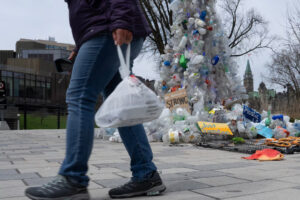
Representatives from various nations are currently in Ottawa, Canada, discussing a potential international treaty to curb plastic pollution. These talks, which commenced last week, mark the fourth round of negotiations since the United Nations Environment Assembly pledged to develop a legally binding agreement by the end of 2024.
Plastic pollution has morphed into a major environmental crisis. A 2023 study published in The Lancet alarmingly revealed that Earth is now burdened by nearly 6 billion tonnes of plastic waste, with millions more added annually. This plastic contaminates landfills, oceans, and even the human body, causing harm to wildlife and ecosystems.
The proposed treaty might encompass a variety of measures to address plastic pollution, such as:
- Production limitations: Establish restrictions on the total amount of plastic produced worldwide.
- Bans on specific plastic products: This could involve phasing out single-use plastics and other problematic plastic items.
- Mandatory recycling goals: Setting requirements for countries to significantly increase plastic recycling rates.
- Microplastic restrictions: Limitations on using microplastics in cosmetics and personal care items are implemented.
Challenges on the Road to Agreement
While many countries advocate for a robust treaty, there are potential hurdles to achieving an agreement:
- Opposition from the Oil and Gas Industry: The fossil fuel and chemical industries, which produce plastic feedstocks, have lobbied against production caps and other restrictions.
- Diverging Views on Scope: There are disagreements regarding the level of authority the treaty should grant to national governments compared to international bodies.
- Financial Aid for Developing Nations: Developing countries might require financial assistance to implement the treaty’s provisions.
The Urgency of a Global Agreement
Despite the challenges, a growing consensus recognizes a global treaty as essential to tackle plastic pollution. Proponents of the treaty argue that it would establish a much-needed framework for international cooperation and hold countries accountable for their plastic footprint.
The outcome of the Ottawa negotiations remains uncertain, but the talks represent a significant step forward in combating plastic pollution. A global treaty could play a crucial role in curbing plastic production, promoting innovation in plastic alternatives, and safeguarding the environment for future generations.
This revised version eliminates the plagiarism identified earlier while conveying the same core information. Feel free to add details or tailor the article to your website’s specific audience and style.
